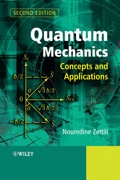Physics 480
|
|||||||||||||||||||||||||||||||||||
| Dr. Doug Harper Department of Physics and Astronomy Western Kentucky University Thompson Complex Center Wing, Room 226 |
E-Mail: Internet: Office: API: |
Doug.Harper at wku.edu http://physics.wku.edu/~harper/ 745-6194, TCCW 226 780-3859 |
Course Description
A study of the fundamental principles of quantum mechanics including the hydrogen and helium atoms, the harmonic oscillator, and the Schrödinger wave equation.
Prerequisites
- PHYS 321 - Modern Physics I, AND
- PHYS 350 - Classical Mechanics I, AND
- MATH 327 - Multivariable Calculus, AND
- One of the following
- PHYS 440 - Electromagnetism I, OR
- PHYS 450 - Classical Mechanics II, OR
- MATH 435 - Partial Differential Equations.
Textbook
 |
|
Grading Policies
Your grade for the course will be based on your performance on the homework assignments, class presentations and examinations according to the usual distribution shown in Table 1 below. The weights (in percent) that will be applied to the homework and exams are shown in Table 2.
|
|
||||||||||||||||||||||||||||
Homework
- Homework sets will be assigned on a routine basis.
- To be eligible for full credit, homework must be submitted at the beginning of class on the due date.
- Homework sets submitted past this deadline, but prior to the next beginning of class following the due date, will be considered late and the grade will be reduced by 50%. Homework sets will not be accepted following the 50% credit deadline. There will be no exceptions to this policy.
-
Homework Requirements: Papers that do
not meet the criteria below will be returned ungraded and can be
submitted again for up to 50% credit.
- Homework papers should be neat, clean, organized, and easy to read.
- Each problem should begin at a top of a page of paper and the problem number be clearly labeled.
- Your name should be on the top right hand of at least the first page of the assignment.
- The reasoning processes used in solving each problem should be fully explained. I can only infer your train of thought from what you have written on the paper. When grading your homework I will look for evidence that your results were obtained by an orderly and logical process.
- It is permissible for students to discuss homework problems with one another. However, such discussions should involve contributions from each student participating. Mere copying of another person's work is considered cheating and will result in a grade of zero for all involved if detected.
Presentations
- Each class following opening comments and questions we will start class with a presentation of an example problem from a student.
- The student presenter should prepare a clear, complete, written solution of the problem prior to class and should provide a copy (three-hole punched) for all students in the class as well as the instructor.
- The presenter should create a PDF of the presentation and upload it to the "Class Presentations" forum on Blackboard prior to class. This file can then be displayed on the projector as the solution is presented to the class.
- The presenter may use the facilities in the office for preparing the copies. However, do not expect to be successful in doing this just prior to class start.
- The solution should include a full statement of the problem along with any necessary diagrams or sketches required to describe the problem.
- The solution should be detailed showing all of the steps necessary to solve the problem.
- The presentation should be brief (usually no more than 5 minutes) and should focus only the major concepts and steps of the solution. Do not focus on minutia during the presentation.
Exams
- Two exams will be given during the semester. The exams, which will consist mostly of problems and derivations, will be based on material from the lectures, from assigned readings, and from homework problems.
- If you are unable to take an exam you may request permission from the instructor before the regularly-scheduled exam period to take a makeup exam. However, a serious reason is required to warrant the scheduling of a makeup exam.
- The final examination will be comprehensive.
Attendance Policy
- Punctual and regular attendance is expected of everyone at all times.
Additional Reference Material
In addition to the textbook for the course, you should consider obtaining some additional mathematical reference materials. These books will prove useful not only for this course, but for subsequent undergraduate and/or graduate courses in physics. Some math texts that I have found particularly helpful include:
- CRC Standard Mathematical Tables, William H. Beyer (CRC Press).
- Tables of Integrals, Series, and Products, I.S. Gradshteyn and I.M. Ryzhik (Academic Press).
- Mathematical Methods for Physicists, George Arfken (Academic Press).
- Mathematical Methods in the Physical Sciences, Mary L. Boas (John Wiley & Sons).